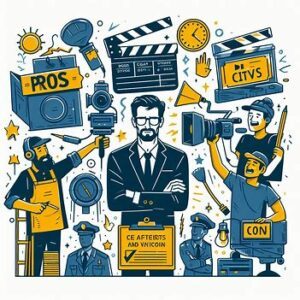How to Become a TV Director: A Step-by-Step Guide
Hello my article on How to Become a TV Director: A Step-by-Step Guide will tell ,you all about the many jobs a tv director has and what type of educational tools you need to do to become one..

The Tv Director Genius At Work
Becoming a TV director is a dream for many people who are passionate about television and film. However, it takes a lot of hard work, dedication, and a bit of luck to achieve this goal. The role of a TV director is to oversee the creative aspects of a TV show or film, from casting to camera angles to post-production. They work closely with producers, writers, and actors to bring a story to life on the screen.
To become a TV director, one needs to have a deep understanding of the craft and industry. This includes having a solid foundation in film theory, storytelling, and technical skills such as camera work and editing. It’s also important to have a strong network of industry contacts, as well as the ability to pitch ideas and sell oneself as a director. While there is no set path to becoming a TV director, there are certain steps that can be taken to increase one’s chances of success.
Understanding the Role of a TV Director
Job Description
A TV director is responsible for overseeing the creative and technical aspects of a television production. They are responsible for bringing the script to life, making decisions on camera angles and shots, and working with actors to ensure the best possible performance. The director is also responsible for ensuring that the production stays on schedule and within budget.
Roles and Responsibilities
The roles and responsibilities of a TV director can vary depending on the type of production they are working on. In general, a TV director is responsible for:
- Collaborating with the producer, writer, and other members of the production team to develop a vision for the show
- Casting actors and working with them to develop their performances
- Creating shot lists and storyboards to plan out the visual elements of the production
- Directing the camera crew and other technical staff during filming
- Making real-time decisions about camera angles, lighting, and other technical aspects of the production
- Ensuring that the production stays on schedule and within budget
- Collaborating with the post-production team to edit and finalize the finished product
Overall, a TV director must have a strong creative vision, excellent communication and leadership skills, and the ability to work well under pressure. They must also be able to work collaboratively with other members of the production team to bring the vision of the show to life.
Educational Requirements
Degree in Film or Media Studies
To become a TV director, it is recommended to have a degree in film or media studies. This degree will provide a solid foundation in the technical and creative aspects of filmmaking, including directing. Some of the courses that are typically included in this degree program are film history, screenwriting, cinematography, and film editing.
A degree in film or media studies will also provide opportunities for students to gain practical experience in filmmaking through internships and hands-on projects. These experiences will help students develop the skills necessary to become a successful TV director.
Courses in Directing
In addition to a degree in film or media studies, it is essential to take courses in directing. These courses will provide a more in-depth understanding of the art of directing, including camera angles, lighting, and sound.
Some of the courses that are typically included in a directing program are script analysis, blocking, and rehearsals. These courses will help students develop their skills in working with actors, creating a vision for a project, and managing a crew
Overall, a combination of a degree in film or media studies and courses in directing will provide the necessary knowledge and skills to become a successful TV director.
Being a TV director can be a rewarding but challenging career. Here are some of the pros and cons
 according to various sources:
according to various sources:
Pros:
- You get to work on creative projects and collaborate with actors, writers and crew members.
- You have the opportunity to become famous and earn recognition for your work
- You can make decent money depending on the type and popularity of the show you direct
Cons:
-
- You may face high levels of stress and deadline expectations
- You may have inconsistent work and need to find a secondary job.
- You may have to work long and irregular hours, including evenings, weekends and holidays.
- You may face a highly competitive field and need to network and pitch your ideas constantly.
TV directing is a challenging and rewarding job that requires a great deal of skill, creativity, and technical expertise. While there are many benefits to working as a TV director, there are also some drawbacks that must be considered. In this article, we will explore the pros and cons of TV directing, and provide insights into what it takes to succeed in this exciting and dynamic field.
One of the biggest advantages of TV directing is the opportunity to work with talented actors, writers, and producers. TV directors have the ability to shape the creative vision of a show, and to bring their own unique perspective to the table. They also have the chance to work on a wide range of projects, from drama series to reality shows, and to collaborate with a diverse range of professionals.
However, there are also some downsides to working as a TV director. One of the biggest challenges is the long hours and demanding schedule. TV directors must be able to work under pressure, and to manage a large team of professionals while staying focused on the creative vision of the show. They must also be able to adapt quickly to changes in the script or production schedule, and to communicate effectively with actors and crew members.
TV directing is the art of bringing a script to life by creating a visual narrative that engages the audience. It is a complex process that requires a deep understanding of storytelling, camera work, lighting, sound, and editing.
One of the most important aspects of TV directing is the ability to translate the writer’s vision into a visual language that can be understood by the audience. This involves making creative decisions about camera angles, shot composition, and movement that complement the script and enhance the story.
Another fundamental skill of TV directing is the ability to work with actors. A good director knows how to communicate effectively with actors, helping them to deliver authentic and compelling performances that resonate with the audience.
Conclusion 
Television directors are a vital component in the production process of TV shows, as they advise actors on their performances, coordinate camera angles and meet with producers to ensure they are capturing the overall style and tone of the series. While they usually play less of a creative role than their film director counterparts, the contributions of TV directors are nevertheless necessary for the production of television programs. If you’re interested in pursuing a career in television production, understanding the role and responsibilities of a TV director can be helpful for determining if the entertainment industry is the right field for you. click amazon.com
TV directing is a crucial aspect of the television industry. It is responsible for bringing the script to life and creating a visual representation of the story. The director is responsible for guiding the actors, camera crew, and other technical staff to ensure that the final product is of the highest quality.
One of the most important aspects of TV directing is the conclusion. The conclusion is the final scene or shot that brings the story to a close. It is the last chance for the director to leave a lasting impression on the audience. A well-executed conclusion can make the difference between a good show and a great one.